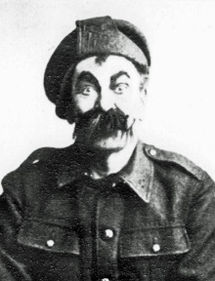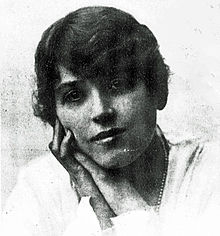- The Better 'Ole
-
The Better 'Ole or The Romance of Old Bill 
Arthur Bourchier as Old BillMusic Herman Darewski[1] Lyrics Percival Knight
James Heard[1]Book Bruce Bairnsfather
Arthur ElliottBasis Old Bill (cartoon character) Productions 1917 London
1917 UK tour
1918 Broadway
International productionsThe Better 'Ole, also called The Romance of Old Bill, is an Edwardian musical comedy with a book by Bruce Bairnsfather and Arthur Elliott, music by Herman Darewski, and lyrics by Percival Knight and James Heard, based on the cartoon character Old Bill, an infantryman, drawn by Bairnsfather. In the musical, Old Bill intercepts a spy's plan to destroy a bridge, trapping a French regiment after they cross it. Bill saves them by blowing up the bridge before they pass; his actions are misunderstood, however, and he is arrested for disobeying orders and holding an enemy document. After Victoire explains the situation, Bill is released and given a medal.
The original London production in 1917 was a hit, running for over 800 performances, starring Arthur Bourchier as Old Bill. The piece also had success on tour and on Broadway the following year and spawned two film adaptations and a sequel.
Contents
Productions
- London and original tour
On 4 August 1917, The Better 'Ole opened in London at the Oxford Music Hall, where it ran for 811 performances, starring Arthur Bourchier as Old Bill.[2][3] It was produced by Charles B. Cochran.[4] After the success of the London production was apparent, a provincial touring company was formed, led by Martin Adeson as Old Bill.[4]
- Broadway
It later also ran successfully on Broadway, where Charles Coburn starred as Old Bill opposite his wife, who played Victoire; the couple are also credited as the producers of the Broadway production.[5] The production first played downtown at the Greenwich Village Theatre, then moved to Broadway at the Cort Theatre and later the Booth Theatre.[6][5] Choreographed by Lily Leonora, the show played from 19 October 1918 to 4 October 1919, lasting 353 performances.[1][5]
- Subsequent productions
By 1919, five productions of the "smashing success" were running in North America (including the New York premiere). These productions starred De Wolf Hopper, Maclyn Arbuckle, Edmund Gurney and James K. Hackett as Old Bill in Chicago, Philadelphia, Boston and Canada, respectively.[7]
Plot
The Times commented that there was not much plot, and what there was did not matter much.[8] The Play Pictorial gave the following plot summary:
[T]here is but one dramatic episode in the piece. … It is the acquisition of the Spy's letter containing the information as to the mining of the bridge over which the French are going to attack, when with the aid of Victoire Bill realises its purport, he determines to frustrate the enemy's intention by blowing up the bridge in advance. His mission fulfilled, he finds himself under arrest for disobedience to orders; he is further compromised by the possession of an incriminating enemy document; death by a firing party at dawn appears to be his imminent fate. But a kindlier fate has interposed in the person of Victoire. She has gone to the French Headquarters with the story of his gallantry, and an officer of the French Staff arrives, bearing with him the glorious Cross of Honour.[4]
Musical numbers
The following numbers were used in the New York production:[6]
- "Tommy" – Suzette from France and Tommies
- "That Trip Across the Rhine" – Captain of the Women's Workers' Camp and Women War Workers
- "Carrying On" – Bert, Alf and Old Bill
- "We Wish We Was in Blighty" – Bert, Alf and Old Bill
- "When You Look in the Heart of a Rose" – Company
- "Venus de Milo" – Old Bill
- Je Sais Que Vous Etes Gentil ("I Know You Are Nice") – Berthe and Bert
- "Regiment of Our Own" – Bert and French Girls
- "Regiment of Our Own" (reprise) – Bert and Mollie from Ireland
Roles and original casts[4]
The list below shows first the London, then the New York casts:
- Old Bill – Arthur Bourchier; Charles D. Coburn
- Victoire – Edmée Dormeuil (later, Peggy Foster); Mrs. Charles D. Coburn
- Bert – Tom Wootwell; Charles McNaughton
- Alf – Sinclair Cottee; Colin Campbell
- Spy – M. Crommelynck; Lark Taylor
- Angele – Chris Birss; Gwen Louis
- Suzette – Glory Edgar; Mona Desmond
- W.A.A.C. – Hilda Denton; Lillian Spenser
- Berthe – Carrie Rose; Helen Tilden
Critical reception
In The Play Pictorial, B. W. Findon wrote, "Old Bill stands out with the vividness of a Shakespearean creation, as forcible as Falstaff, as quaint as Dogberry. It is for this reason that he has caught the imagination of the public, that he attracts myriads to the Oxford and fills them with the glory of their race. … A great entertainment, in brief; a revue of the war most admirable. It will be a prodigious success in America and the far lands. We have had nothing like it, I repeat, and assuredly there is here that which will make the whole civilised world akin."[4] The Times commented, "The Bairnsfather jokes are as amusing on the stage as they are when printed."[8] The Observer said of Bourchier's depiction of Old Bill, "If others have been more sardonic and incisive, he is more good-natured and appealing." The paper thought the piece "unduly spun out, perhaps, because there is a limit to the humorous side of war."[9]
Of the New York production, The New York Times wrote that it "sweeps an audience off its feet by the sheer force of sincerity. Sooner or later everyone will see it and those will be fortunate to do so while it retains the bloom of its first inspiration".[5]
Adaptations and sequel
Two film adaptations of the musical were made during the silent film era. The first, a 1919 British version, starred Charles Rock.[10] The second version was a 1926 Warner Bros. production.[11] This film – the second feature to use the Vitaphone sound process – starred Sydney Chaplin as Old Bill.[11]
The success of the piece led to a West End sequel, Old Bill, M.P., which opened at the Lyceum Theatre on 12 July 1922. Old Bill was played by Edmund Gwenn, and Bairnsfather appeared as himself. Unlike The Better 'Ole, the later piece was not a musical.[12] It ran until 11 November 1922.[13]
References
- ^ a b c Martin Bordman, Gerard. "American musical theatre: a chronicle", pg. 383, Oxford University Press US, 2001, accessed 12 September 2010.
- ^ Bourchier, Arthur. "Who Was Who", A & C Black, 1920–2007, online edn, Oxford University Press, December 2007, accessed 28 October 2008.
- ^ "The Better 'Ole". Broadwayworld.com, accessed 12 September 2010.
- ^ a b c d e "Charles B. Cochran's production of The Better 'Ole Or The Romance of Old Bill. The Play Pictorial, 32:191, January 1918, p. 18
- ^ a b c d "Bairnsfather Play Down in Greenwich". The New York Times, 21 October 1918, accessed 27 October 2010.
- ^ a b The Broadway League. "The Better 'Ole". IBDB: The Official Source for Broadway Information, accessed 11 January 2011.
- ^ "The Stage". Munsey's Magazine, Volume 66, p. 761, The Frank A. Munsey company (1919), accessed 23 June 2011
- ^ a b "The Better 'Ole: A Bairnsfather Play at The Oxford", The Times, 6 August 1917, p. 9
- ^ "Dramatis Personae", The Observer, 12 August 1917, p. 5
- ^ The Better 'Ole (1919) at the Internet Movie Database
- ^ a b The Better 'Ole (1926) at the Internet Movie Database
- ^ "Old Bill, M.P.", The Times, 13 July 1922, p. 12
- ^ "Varieties &c", The Times, 11 November 1922, p. 8
External links
Categories:- Musicals based on comic strips
- Broadway musicals
- 1917 musicals
Wikimedia Foundation. 2010.

